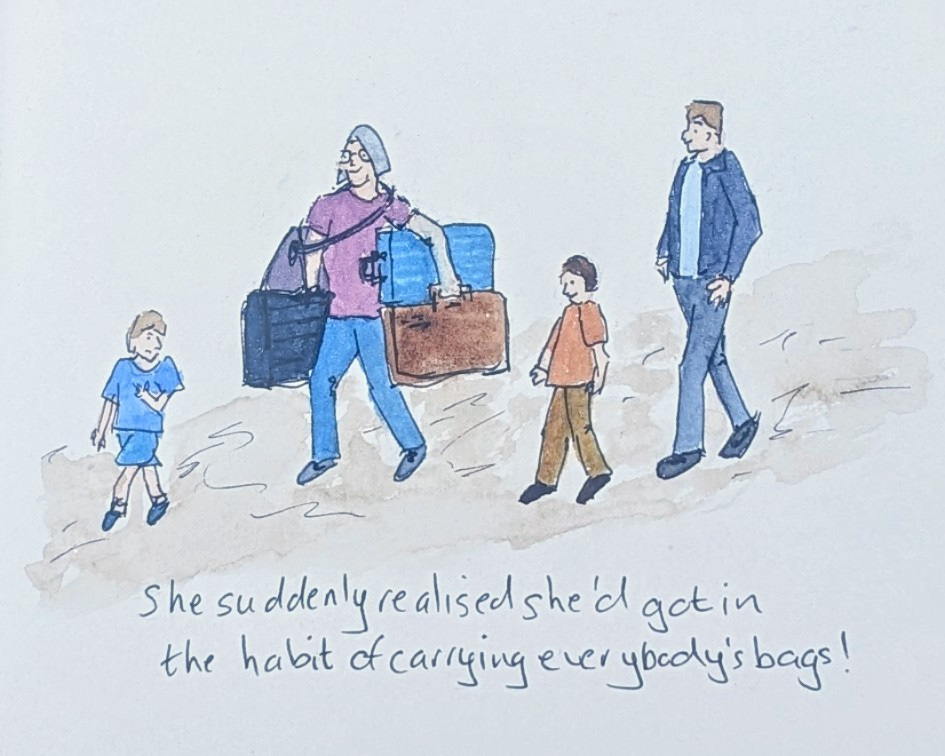Carrying What's Ours
On responsibility, boundaries, and the freedom to set things down.
I have noticed how quickly I can rush in to help, picking up responsibilities that do not actually belong to me. It comes from a good place. I care deeply, and I want to ease the weight for people. But I have also started to wonder: at what point does caring become over-carrying? And how much of my energy is spent lugging around things that were never mine to begin with?
When I read Suzanne Alderson's post "Giving up Responsibility", the questions I’d been gently musing on started demanding more attention. Suzanne writes about how responsibility became her “first language,” a survival strategy learned early in life. If she anticipated what people needed, things felt calmer and safer, and she became very skilled at it.
But she also describes the cost. When responsibility is your first language, you start translating everything into it. You do not just help, you hold it all, even when it is not yours to hold. Suzanne beautifully captures the slow, hard work of unlearning this: the small mantra “not mine,” repeated again and again until her body began to believe it.
Her words resonated with me. I, too, can so easily pick up what does not belong to me. Sometimes it is out of compassion, sometimes out of fear of what might happen if I do not. And sometimes, if I am honest, it is because helping gives me a sense of worth. But over time, carrying everyone else’s load becomes exhausting. It leaves little space for joy, creativity, or rest. It is like painting every inch of my paper in dense colour until there is no light, no contrast, no space for the picture to breathe.
Interestingly, this is not a new tension. The apostle Paul, writing to one of the early communities he cared for, put it in words that have stayed with me: on the one hand, he urged them to carry one another’s burdens, and on the other, he reminded them that each person has their own load to carry. At first glance, it seems contradictory, but actually, it is not. It is wisdom. There are times when someone’s knees are buckling under the sheer weight of life, and in those moments, we are called to step in. But there are also the everyday responsibilities that belong to each of us, the backpacks we all need to carry ourselves, because that is how we grow. In painting terms, there are times when a bold brushstroke is needed to bring out a form, and times when leaving space is what makes the whole work come alive.
Modern psychology echoes this. Researchers on burnout and caregiver fatigue show how taking on too much responsibility for others can lead to exhaustion and even resentment. Brené Brown says,
“Daring to set boundaries is about having the courage to love ourselves even when we risk disappointing others.”
It is a reminder that healthy love does not mean carrying everything. Sometimes it means trusting that others are capable of holding what belongs to them, even if they drop it. Like an artist seeing their paint drip or a line wobble, the instinct is to fix it, but sometimes the imperfection is what brings character and life to the picture.
I love Suzanne’s honesty about how messy this process can be. Letting go is not graceful. It comes with guilt, second-guessing, and the uncomfortable feeling of watching things wobble when you are not propping them up. But as she discovered, there are often no major shakes when we step back. Sometimes, others step in. Sometimes, they do not. And either way, life keeps going.
For me, learning to set things down is also about faith. I believe we are not meant to carry everything alone. There is a rhythm of sharing, releasing, and resting. I do not want to lose the part of me that cares deeply; that is something I treasure. But I also do not want to flatten myself under the weight of things that were never mine.
As I’ve been learning with responsibility, so too with watercolours. I don’t need to hold everything so tightly. Life doesn’t always ask for firm edges and perfect lines. Sometimes it asks for space, for trust, for colour to flow where it will.
The art, in life as in watercolour, is knowing when to guide the brush and when to let the paint move freely, when to carry a burden for someone else, and when to whisper, “not mine,” and lay it down. Beauty and rest can emerge in those spaces, not because I controlled it all but because I finally allowed some colour to flow on its own.
So perhaps the invitation is this: to keep caring but with discernment, to know when to step in and when to step back, and to trust that in setting down the baggage, what is extraordinary can quietly unfold without your striving, often more beautifully than you imagined.



Thanks Andrea. I loved Suzanne’s post and I’m loving your words and thoughts too Andrea, you have made it your own. They both have given me lots to think about as I go forward. Setting boundaries can feel so hard but is definitely beneficial at times.
I will move forward and keep caring but with discernment, learning to know when to step in and when to step back, and to trust that in setting down the baggage, what is extraordinary can quietly unfold without your striving, often more beautifully than you imagined.